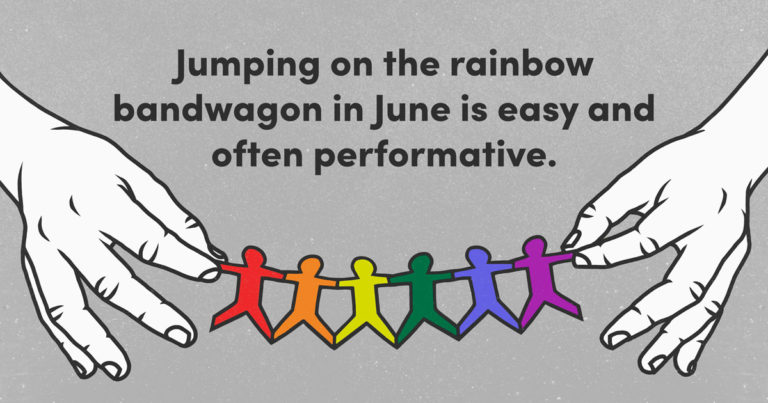

It’s easy—or easier—to do something when other people are doing it. Some call it peer pressure, safety in numbers, or support. And when an activity or product is marketed well, the inclination to try a new exercise routine, fashion, Netflix series, or holistic approach to health feels safer when everyone seems to be talking about it or trying it out. If you experience joy and success, great! Good thing you didn’t miss out! If the thing you tried is a bust, well, you’re not alone in being duped. Everyone was tricked and you can let go of accountability. This is why trends occur and why everyone seems to have an air fryer but me—I’m just not interested. There’s also some herd mentality in folks declaring allyship during Pride month. It’s easy to call yourself an ally when everyone else is doing it but many folks who say they’re allies to the LGBTQIA+ community aren’t.
Jumping on the rainbow bandwagon in June is easy and often performative. People and companies like to pat themselves on the back by publicly declaring their support of the queer community, because they feel like they are doing the “right thing.” Or they do it because they don’t want to be accused of being homophobic. But that’s not allyship; that’s centering yourself in a community you must not truly understand if you think the only time we need support is in June.
While I see this more during Pride month than during any other month of the year—I see the filters over your profile pictures and photos from the Pride parade you attended—too many people call themselves allies when they shouldn’t year round. Sometimes folks will declare this title for themselves after discrimination, trauma, or anti-queer legislation makes headlines. It’s their way of trying to support their queer friends, but if that allyship doesn’t come with everyday action then the words are shallow and the support feels fickle.
It’s nice to know you accept and support the LGBTQIA+ community so please keep doing that. But allyship is more than knowing a gay or transgender person and being okay with it. It’s more than having queer friends. It’s more than saying we deserve the same rights and protections. It’s so much more than buying new rainbow gear in June. And depending on where you buy said gear, you may be contributing to companies who put more money into anti-LGBTQ legislation than into organizations that benefit queer people. Not knowing the difference between uplifting LGBTQIA+ folks and padding the pockets of people who don’t give a fuck about us is not allyship.

Allyship is work and it starts with educating yourself on the issues that negatively impact the LGBTQIA+ community. What laws in your state limit the rights of queer and transgender people? Does your school district have a LGBTQIA+ inclusive curriculum that includes queer history and sexual health for all identities and relationships? Are your co-workers or employees protected against anti-LGBTQIA+ discrimination? Is your church affirming? Now what are you doing to make all of these spaces safer for your queer community members, friends, and family members? Are you working on policy change? When you call yourself an ally, are you also working to dismantle racist, sexist, ableist, and xenophobic systems? Queer people hold many identities and allyship needs to include the intersection of those identities.
I know not everyone is capable or willing to do this type of work. Activism is just one form of allyship, but this work from the ground up is what makes change. It saves lives. If you can’t offer hands-on allyship, then offer your money to those who are doing the work. Or give money directly to queer people who need it. If you search “LGBTQ” or “transgender” on GoFundMe you will find thousands of folks and organizations that need help. On Twitter, the hashtag TransCrowdFund will lead you to many folks who need help paying for affirming care, housing, or transportation.
If money isn’t something you can give, then give up your comfort. Speak up and for LGBTQIA+ people and do it every chance you get, even when it means confronting a friend or family member. Allyship is loud and messy and doesn’t leave any doubt about your willingness to stand up for me or other queer folks when we need it and it’s not always comfortable and easy. I and other queer folks need to know we can count on you when it’s not June, because allyship is not simply cheering for the gay man proposing to his boyfriend on a Pride float.
LGBTQIA+ allyship is not a label you can give yourself; you need to earn it and have it given to you. You need to get the queer stamp of approval before you throw around the word ally. Accepting us does not mean you are fighting for us, giving us safe spaces to exist, or using your privilege to amplify our voices.
Take a look at when you decide to show your support or announce your love for the queer community. And when you call yourself an ally, what action have you taken to give that word meaning? Are you doing what’s easy or what’s necessary? Don’t tell me you are an ally; show me.